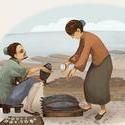-
Welcome to the eG Forums, a service of the eGullet Society for Culinary Arts & Letters. The Society is a 501(c)3 not-for-profit organization dedicated to the advancement of the culinary arts. These advertising-free forums are provided free of charge through donations from Society members. Anyone may read the forums, but to post you must create a free account.
Molly O'Neill's new article "Food Porn"
-
Similar Content
-
- 14 replies
- 2,274 views
-
- 93 replies
- 6,871 views
-
- 296 replies
- 30,890 views
-
- 296 replies
- 30,890 views
-
- 34 replies
- 2,310 views
-
-
Recently Browsing 0 members
- No registered users viewing this page.




Recommended Posts